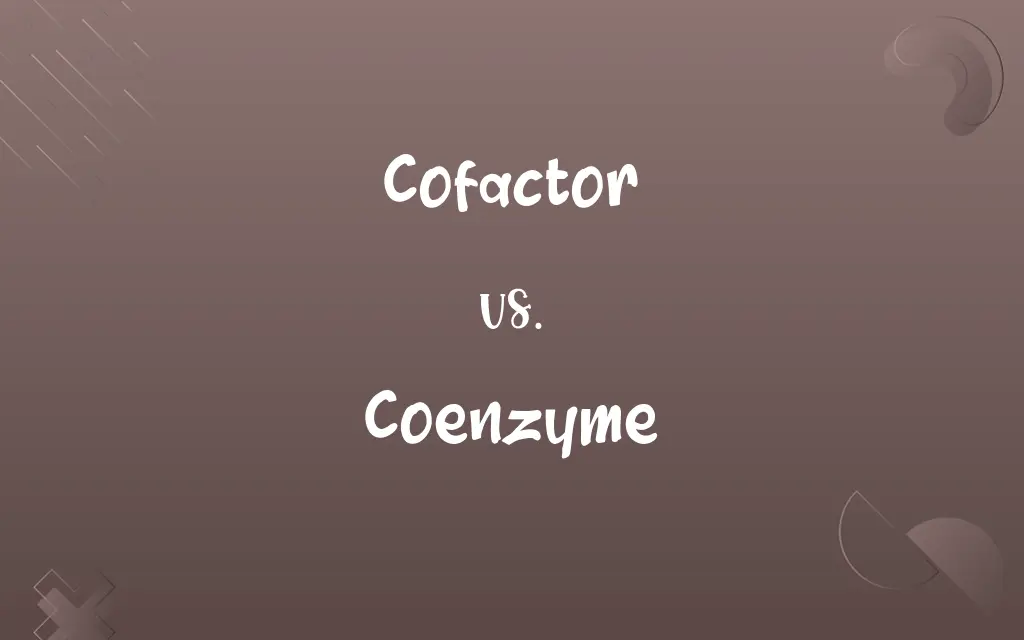Cofactor vs. Coenzyme: Know the Difference

By Shumaila Saeed || Updated on December 25, 2023
A cofactor is a non-protein chemical compound that assists enzymes, while a coenzyme is a specific type of cofactor, usually an organic molecule, needed for enzyme function.

Key Differences
Cofactors are diverse chemical compounds that assist enzymes in catalyzing reactions. Coenzymes, a subset of cofactors, are typically organic molecules derived from vitamins.
Shumaila Saeed
Dec 12, 2023
Cofactors can be either inorganic or organic substances that help enzymes perform their catalytic activity. Coenzymes act as carriers for atoms or functional groups during enzymatic reactions.
Shumaila Saeed
Dec 12, 2023
Cofactors include metal ions like iron and zinc, and organic molecules like coenzymes. Coenzymes include NAD+ and FAD, which are vital in redox reactions.
Shumaila Saeed
Dec 12, 2023
Cofactors may be tightly or loosely bound to enzymes. Coenzymes usually bind loosely to the enzyme's active site, facilitating the transfer of chemical groups.
Shumaila Saeed
Dec 12, 2023
Cofactors often come from dietary minerals, while coenzymes are typically derived from vitamins, emphasizing the importance of a balanced diet for enzymatic functions.
Shumaila Saeed
Dec 12, 2023
ADVERTISEMENT
Comparison Chart
Definition
Non-protein compound aiding enzymes
Specific type of cofactor, usually organic
Shumaila Saeed
Dec 12, 2023
Role
Assist in enzyme catalysis
Act as carriers in enzyme-mediated reactions
Shumaila Saeed
Dec 12, 2023
ADVERTISEMENT
Cofactor and Coenzyme Definitions
Cofactor
A substance that enhances the action of an enzyme.
Magnesium acts as a cofactor for many enzymes.
Shumaila Saeed
Dec 05, 2023
Coenzyme
Typically binds loosely to enzymes, facilitating group transfers.
Coenzymes loosely attach to enzymes to assist in reactions.
Shumaila Saeed
Dec 05, 2023
Cofactor
A compound that increases the rate of enzyme-catalyzed reactions.
Certain cofactors accelerate biochemical reactions.
Shumaila Saeed
Dec 05, 2023
Coenzyme
A substance derived from vitamins that assists enzyme function.
Many coenzymes in the body originate from vitamins.
Shumaila Saeed
Dec 05, 2023
Cofactor
A non-protein chemical that assists in enzyme activity.
Cofactors, like iron, are crucial for enzymatic reactions.
Shumaila Saeed
Dec 05, 2023
ADVERTISEMENT
Coenzyme
An organic non-protein compound that helps enzymes catalyze reactions.
Coenzyme A is essential in various metabolic pathways.
Shumaila Saeed
Dec 05, 2023
Cofactor
A molecule that binds to an enzyme to promote its activity.
The enzyme's activity increased with the addition of a cofactor.
Shumaila Saeed
Dec 05, 2023
Coenzyme
A molecule that transfers functional groups in enzymatic reactions.
NAD+, a coenzyme, plays a key role in redox reactions.
Shumaila Saeed
Dec 05, 2023
Coenzyme
A partner molecule to enzymes in biochemical transformations.
Coenzymes are vital partners for enzymes in metabolic processes.
Shumaila Saeed
Dec 05, 2023
Cofactor
A substance, such as a metallic ion or coenzyme, that must be associated with an enzyme for the enzyme to function.
Shumaila Saeed
Dec 01, 2023
Coenzyme
An organic substance that reversibly combines with a specific protein, the apoenzyme, and with a substrate to form an active enzyme system.
Shumaila Saeed
Dec 01, 2023
Coenzyme
(biochemistry) Any small molecule that is necessary for the functioning of an enzyme.
Shumaila Saeed
Dec 01, 2023
Cofactor
(biochemistry) A substance, especially a coenzyme or a metal, that must be present for an enzyme to function.
Shumaila Saeed
Dec 01, 2023
Coenzyme
A molecule that is essential for the activity of some enzymes; it may exist free in solution within a living organism, but functions by binding to an enzyme to assist in catalyzing a reaction. The molecule itself may be temporarily changed during the reaction, but is ultimately restored to its original form. Many vitamins function as coenzymes.
Shumaila Saeed
Dec 01, 2023
Cofactor
(biochemistry) A molecule that binds to and regulates the activity of a protein.
Shumaila Saeed
Dec 01, 2023
Coenzyme
A small molecule (not a protein but sometimes a vitamin) essential for the activity of some enzymes
Shumaila Saeed
Dec 01, 2023
Cofactor
(mathematics) The result of a number being divided by one of its factors.
Shumaila Saeed
Dec 01, 2023
Cofactor
The signed determinant of the submatrix produced by removing the row and column containing a specified element; primarily used in the recursive definition and calculation of the determinant of a matrix.
Shumaila Saeed
Dec 01, 2023
Cofactor
A substance (as a coenzyme) that must join with another to produce a given result
Shumaila Saeed
Dec 01, 2023
Cofactor
Diverse substances ranging from metal ions to organic molecules aiding enzymes.
A variety of cofactors are involved in cellular metabolism.
Shumaila Saeed
Dec 05, 2023
Repeatedly Asked Queries
What is a coenzyme?
A specific type of cofactor, usually an organic molecule.
Shumaila Saeed
Dec 12, 2023
What is a cofactor?
A non-protein chemical that assists enzymes in catalysis.
Shumaila Saeed
Dec 12, 2023
Can cofactors be inorganic?
Yes, many cofactors are inorganic, like metal ions.
Shumaila Saeed
Dec 12, 2023
Do cofactors bind permanently to enzymes?
Some cofactors bind permanently, while others bind temporarily.
Shumaila Saeed
Dec 12, 2023
What is an example of a coenzyme?
NAD+ is a well-known coenzyme involved in redox reactions.
Shumaila Saeed
Dec 12, 2023
Do enzymes require cofactors to function?
Many enzymes require cofactors for their full activity.
Shumaila Saeed
Dec 12, 2023
Are all coenzymes derived from vitamins?
Most coenzymes are vitamin-derived, but not all.
Shumaila Saeed
Dec 12, 2023
Can coenzymes be reused?
Yes, coenzymes can be recycled and reused in multiple reactions.
Shumaila Saeed
Dec 12, 2023
How are cofactors obtained?
Cofactors are often obtained from the diet or synthesized in the body.
Shumaila Saeed
Dec 12, 2023
How do coenzymes assist enzymes?
By transporting functional groups between molecules in reactions.
Shumaila Saeed
Dec 12, 2023
Can a deficiency in coenzymes affect health?
Yes, deficiencies can disrupt normal enzymatic functions.
Shumaila Saeed
Dec 12, 2023
Are coenzymes consumed in reactions?
They are not consumed but rather act as transient carriers.
Shumaila Saeed
Dec 12, 2023
What role do cofactors play in metabolism?
They are essential for the functioning of enzymes in metabolic pathways.
Shumaila Saeed
Dec 12, 2023
Do coenzymes alter the enzyme’s structure?
They can induce conformational changes for optimal activity.
Shumaila Saeed
Dec 12, 2023
How do cofactors affect enzyme specificity?
They can enhance the specificity of enzymes for substrates.
Shumaila Saeed
Dec 12, 2023
Why are coenzymes important in redox reactions?
They facilitate the transfer of electrons in such reactions.
Shumaila Saeed
Dec 12, 2023
Are all biologically active coenzymes organic?
Yes, all biologically active coenzymes are organic compounds.
Shumaila Saeed
Dec 12, 2023
Share this page
Link for your blog / website
HTML
Link to share via messenger
About Author
Written by
Shumaila SaeedShumaila Saeed, an expert content creator with 6 years of experience, specializes in distilling complex topics into easily digestible comparisons, shining a light on the nuances that both inform and educate readers with clarity and accuracy.









































































